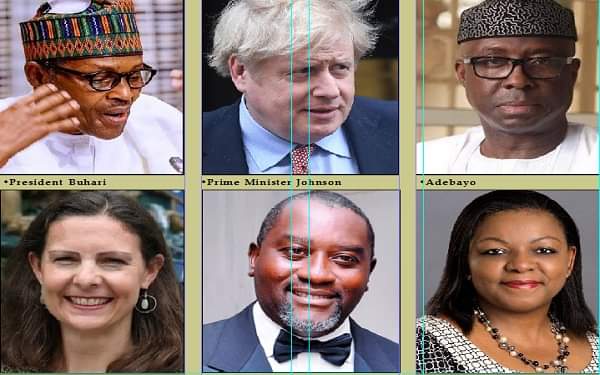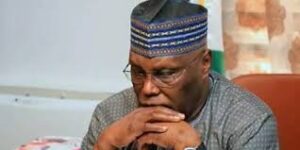
At Nigerian-British Chamber of Commerce webinar, themed, “Nigeria-Britain Bilateral Relationship Post COVID-19”, stakeholders touted Nigeria’s steady rise in the World Bank doing business ranking and financing in the health care sector as some of the great works that the Federal and state governments have achieved. But they noted that the President Muhammadu Buhari administration must tackle issues, including investment in infrastructure, ports management, and movement of goods around the country, foreign exchange, bureaucracy, power sector, among others, which are crucial. ASSISTANT EDITOR BOLA OLAJUWON reports.
As part of preparations for post-COVID-19 business climate, the Nigerian-British Chamber of Commerce held a webinar, with the theme, “Nigeria-Britain Bilateral Relationship Post COVID-19”. Standard Chartered Bank Senior Vice-Chairman Mrs. Bola Adesola, who was the anchor, presented the crux of discussion at the webinar. She said this is the time that COVID-19 presents an unprecedented disruption to the global economy and world trade, as production and consumption have declined across the globe. The World Trade Organisation (WTO), she said, predicts that the pandemic will cause a double-digit decline in trade volumes across every sector and region of the world in 2020.
The bank’s Senior Vice-Chairman Africa said the pandemic will undermine countries’ effort to forester increase trade and investment and will also jeopardise economic growth and development plans.
She said: “Four months ago, the UK-Africa investment summit, which I was privileged to attend, laid the foundation for new partnerships between the UK and Africa in more broadly and Nigeria in particular, for the purpose of this webinar, is based on trade investment shared and mutual interest. And both nations signed commercial deals worth 324 million pounds at the summit. And this was much celebrated after. These commercial deals were positioned to create lasting new partnerships, deliver more investment, jobs and create opportunities for people and businesses across Nigeria and the UK. In light of the current pandemic on Nigeria-British trade, which we will delve into a little bit more during the discussion, and in response to the measures being undertaken by both the Nigerian and British government to reopen their respective economies to business, the NBCC has considered it expedient to host a webinar on Nigeria-British Bilateral Relationship post-pandemic. This webinar will serve as part of our objective as an informative platform to discuss the plans and expectations for Anglo-Nigeria bilateral relationship in the coming months. So, ladies and gentlemen, I am pleased to welcome and introduce our distinguished speakers for today.”
One of the key speakers at the virtual event was the British Deputy High Commissioner to Nigeria, Harriet Thompson, who leads a large and growing mission covering the full spectrum of the UK’s work in Nigeria, with a particular focus on commercial and economic development. Also part of the event was Vice President, Chairman, NBCC Trade Mission Committee Prince Bimbo Olashore, a seasoned investment banker, who over the years has acquired in-depth knowledge and vast experience in the capital market. Olashore retired as the chief executive of officer (CEO) of Lead Capital Plc and is the chairman, Board of Governors of Olashore International School.
Moving on to the meat of the day, which is the panel discussion, Mrs. Adesola said there were few areas, which would be beneficial to the participants for discussion.
“The first one that we will touch on is the ease of doing business. Starting again with our distinguish deputy high commissioner, could you share with us from the UK lens what challenges UK businesses and investors are currently facing in doing business in Nigeria? And what is the outlook for foreign investment and for British companies in the short to medium term?” Adesola asked.
Responding, Thompson opined: “I am sure this audience can imagine the impact of coronavirus around the world has really changed the economic outlook, the prospects for British businesses and all businesses and as to the companies that we have here in Nigeria and as well as any other. The challenges that our companies here face are similar to those that Nigerian companies face in doing business in Nigeria and indeed other companies here as well. And actually, many of them before the coronavirus pandemic hit are around the ease of doing business. In the years that I have been in Nigeria, it has been great to see Nigeria steadily rising up in the World Bank doing business ranking. And that is testament to some of the great work that the government of Nigeria, state government and at the federal level and many others have been doing. But we all know, especially business people, all know that there are issues remaining, be those around moving goods into the ports, now also moving goods around the country, around forex, around bureaucracy, all of the issues continue.
“One of the things we have been really pleased to see recently is a sense of very strong commitment from the Federal Government that they set out in their letter of intent to the IMF around removing the fuel subsidy around tackling the forex regime, around the power sector, the changes that we really need to see that are absolutely crucial. I think pushing those through at this point will send a very strong message to the companies that are in Nigeria already be they British or Nigerian or any other but also to those looking around more fragile global economic context, thinking about where they might want to be doing business next. On the other hand, some of the steps that have been taken to tackle the spread of COVID 19 which obviously is absolutely crucial have come at a heavy economic cost.
“And I am particularly thinking about those measures that have stopped goods from moving around the country, disrupting supply chains including essential goods, to tackle the pandemic and to maintain production of food for example. We know that it is people it is not good that spread the coronavirus and allowing the movement these goods will help businesses, help ordinary citizens, including the most vulnerable not to be as damaged as might be by the impact of this disease. It is a great opportunity to implement new reforms such as the single window, which the Federal Government is committed to, which will help to mitigate the impact of coronavirus on the economy and to enable recovery.
“Now, at this time, the UK is still highly active in supporting Nigeria to see through some of its reforms, for example, we are providing technical assistance to organisations like Nigerian Investment Promotion Commission (NIPC). We have various programmes that are supporting infrastructure, agriculture, markets, skills, the tech sector. For example, like we are seeing on this webinar now, we are doing more less face-to-face, we are found virtual ways to do technical assistance. We are very cognisance of the fact that the demands of the response to coronavirus mean that we have to really focus on priorities now. So, we are carrying on all of that works but with a different focus and with a different working method.”
Olashore, while expanding on the question a bit more through the Nigerian lens, explained: “I always believe that there is always a silver lining at the end of cloud and at the end of the day COVID 19 is giving us an opportunity to do some of the things we have been talking about in the past. From a Nigerian business environment and for Nigerian companies, in particular, COVID has given us some challenges. We already have infrastructure challenges, we have business challenges. But guess what, a number of those things are being addressed. For sure, we are even moving in the right direction, you can see we are moving up the scale of doing business. But clearly, there are one or two things that have now happened, which are going to make things a lot easier. One is the harmonisation of the exchange rate. I think that is an area Nigerians have been going on for some time, and clearly, it is a move in the right direction.
“There are some investments that are going on that hopefully will make the environment more competitive. The investment we are seeing in health now, you know over the past, we have been talking about our budgetary allocation to health and education, all of a sudden COVID has now made that expedient for us to work on. And for sure that kind of investment will continue. The cost of governance is an area that clearly we need to work on and we are quite pleased that we are seeing movement from government end on the cost of doing business. But the reality of it is that there is still a lot to do.
“The supply chain has been disrupted and even though there are opinions today the mere facts that from the government perspective, they have tried to keep the budget still high means that they still want to go ahead with the investment that they already budgeted for. We know the budget is slightly lower, what that means is that there will be a higher level of government for borrowing to finance what they need to do. But bearing in mind our infrastructural deficit, we clearly have to continue with those investments along those lines.
“So, the key is to continue having investment in infrastructure, obviously, cost of governance comes down and ensure that the environment is much more competitive and clearly we really must build on some of the reforms that we have started.”
Mrs. Adesola said the stakeholders need to help the government also to enhance the cost of doing business in the country and some of the commitments that the government made in terms of FX harmonisation and infrastructure as well. She urged participants to consider Brexit. The banker said people are no longer remembering Brexit, given the fact that “COVID has taken over in our vocabulary”.
Olashore emphasised that the first thing is to try and move up the value chain in some of the things that the country do. According to him, Africa should just stop being a continent that produces export or export only primary products.
“So is quite key that there must be a lot more value-added in our own environment. The key thing again is not just being about value-added, it is also about moving up the quality scale. If you want to export into Europe or any of these markets, you really must meet their own standards. But clearly, we still have opportunities for us in Nigeria in cocoa, sesame seeds, rubber and ginger – these are all primary things. “But also bear in mind that we need to also develop our solid minerals. I have always said Nigerian is not just an oil economy, the economy is getting much more diversified than that. So, there are these products that we also need to get involved in. Also bear in mind that if we improve on our infrastructure, we should look at countries like India has done in which outsourcing has been a very major area.”
Thompson also commented on the UK–Africa Investment Summit few months after it was held and the UK government and the Department for International Trade pledged to commit N13. 1 billion naira investment promotion programme for Nigeria and South Africa to stimulate FDI and facilitate the technology and knowledge transfer as well as the £55 million land transformation facility and £320 million to help the UK financial sector deepen platform to support companies.
The British Deputy High Commissioner revealed that the high commission had started the first of what would become a series of quarterly meetings between Minister Niyi Adebayo and his top officials with biggest British firms in Nigeria.
“And giving them the opportunity to talk virtually face-to-face about some of the key issues that are affecting them and to hear the minister’s views on how those issues may be addressed.”
Nigerian-British Chamber of Commerce Deputy President Bisi Adeyemi said the chamber is the foremost channel of trade and commerce in Nigeria and Britain. “And our mission is to continually encourage and promote mutually-beneficial trade relations between Nigeria and Britain. And our cardinal goals are trade facilitation, positively influencing policy, communicating government, networking and enriching membership experience,” Adeyemi said.












